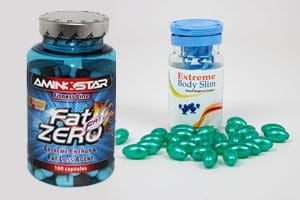
The U.S. Food and Drug Administration (FDA) is warning consumers about some dangerous ingredients used in diet supplements. While supplement manufacturers tout so-called “all natural” ingredients, which sound and may be safe, there are other ingredients in some supplements that are dangerous and some that have been pulled from the market, according to NBC News. […]
 The U.S. Food and Drug Administration (FDA) is warning consumers about some dangerous ingredients used in diet supplements.
The U.S. Food and Drug Administration (FDA) is warning consumers about some dangerous ingredients used in diet supplements.
While supplement manufacturers tout so-called “all natural” ingredients, which sound and may be safe, there are other ingredients in some supplements that are dangerous and some that have been pulled from the market, according to NBC News.
For instance, Fat Zero, which contains bee pollen, green tea, and lotus seed, also contains the now-banned sibutramine, which was only available by prescription. The agency also issued warnings about other, similar diet supplements that claimed to be all natural but which, along with sibutramine, contained phenolphthalein. Phenolphthalein, explained NBC News, is a now-banned laxative that is potentially carcinogenic.
According to the manufacturer’s website, “Fat Zero will give your body the jump start it needs to lose those unwanted pounds.” The FDA notes that it will do just that, but not due to the touted natural ingredients, but because the sibutramine can cause cardiac damage, according to NBC News.
“Sibutramine is a controlled substance that was removed from the market in October 2010 for safety reasons,” the FDA indicates in a notice to consumers. “The product poses a threat to consumers because sibutramine is known to substantially increase blood pressure and/or pulse rate in some patients and may present a significant risk for patients with a history of coronary artery disease, congestive heart failure, arrhythmias, or stroke. This product may also interact, in life-threatening ways, with other medications a consumer may be taking.”
The FDA also just tagged Fruit & Plant Slimming, which contains sibutramine and phenolphthalein and Extreme Body Slim, which tests revealed contains sibutramine, NBC News reported. Sibutramine affects a number of chemicals in the brain, such as serotonin and norepinephrine, according to NBC News. While there is no clear understanding of how this causes weight loss, what is known is that it can increase appetite in some people.
Yesterday’s FDA warning also discussed another so-called “natural” product that contains a prescription drug ingredient. Royal Dragon Herbal Tonic Balls, a supplement touting sexual enhancement, contains vardenafil, which is the active ingredient in the erectile dysfunction (ED) drug Levitra, according to NBC News. “This undeclared ingredient may interact with nitrates found in some prescription drugs, such as nitroglycerin, and may lower blood pressure to dangerous levels,” the FDA cautions. “Consumers should stop using this product immediately and throw it away. Consumers who have experienced any negative side effects should consult a health care professional as soon as possible,” the FDA urged.
Hidden drugs found in these products may also interact with other medications, resulting in serious health consequences.
In the United States, in 1994—when the regulatory structure for dietary supplements was put into law—industry manufactured and marketed 4,000 individual products; today, tens of thousands of these products are sold to Americans who believe them to be safe.
As we’ve explained, while medications undergo safety and efficacy testing in order to receive approval by the FDA for release to market, dietary supplements do not. In the case of supplements, manufacturers must ensure safety, efficacy, and proper labeling. Also, supplements made from products available on the U.S. market prior to 1994 can be sold with no agency review, including a wide variety currently available. Sellers of products containing substances unavailable prior to 1994 need only advise the FDA and do not require approval to be sold.
This means, explained NBC News, if the manufacturers do not make specific health claims, the products may be sold with ingredients “generally recognized as safe.” The FDA may test these products and issue consumer warnings if prescriptions drugs are discovered. Meanwhile, more than half of the Class I drug recalls between 2004 and 2013 involved vitamins and supplements.
The FDA defines a dietary supplement as a product ingested orally and that contains a “dietary ingredient,” which includes vitamins, minerals, herbs, botanicals, or amino acids explained Forbes previously, noting that some 65,000 dietary supplements are on the market and consumed by more than 150 million Americans.


